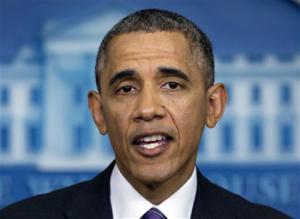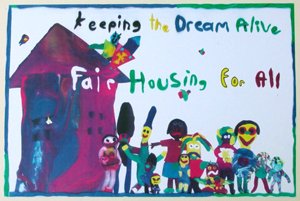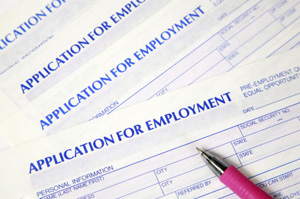
Large quantities of demographic data, often referred to as "Big data," can be used to discriminate against different racial and socio-economic groups.
A White House review of how the government and private sector use large sets of data has found that such information could be used to discriminate against Americans on issues such as housing and employment even as it makes their lives easier in many ways.
"Big data" is everywhere. It allows mapping apps to ping cellphones anonymously and determine, in real time, what roads are the most congested. But it also can be used to target economically vulnerable people.
The issue came up during a 90-day review ordered by President Barack Obama, White House counselor John Podesta said in an interview with The Associate Press. Podesta did not discuss all the findings, but said the potential for discrimination is an issue that warrants a closer look.
Federal laws have not kept up with the rapid development of technology in a way that would shield people from discrimination. The review, expected to be released within the next week, is the Obama administration's first attempt at addressing the vast landscape of challenges, beyond national security and consumer privacy, posed by technological advancements.
President Barack Obama requested the review in January, when he called for changes to some of the National Security Agency's surveillance programs that amass large amounts of data belonging to Americans and foreigners. The technology that enabled those programs also enables others used in the government and the private sector. The White House separately has reviewed the NSA programs and proposed changes to rein in the massive collection of Americans' phone records and emails.
"It was a moment to step back and say, 'Does this change our basic framework or our look at the way we're dealing with records and privacy,'" Podesta said in the interview. "With the rapidity of the way technology changes, it's going to be hard to imagine what it's going to look like a generation from now. But at least we can look out over the horizon and say, 'Here are the trends. What do we anticipate the likely policy issues that it raises?'"

Podesta led the review, along with some of Obama's economic and science advisers. The goal, Podesta said, was to assess whether current laws and policies about privacy are sufficient.
Podesta would not discuss the specific recommendations he will make to Obama. He did mention an unexpected concern that emerged during White House officials' meetings with business leaders and privacy advocates, and merits further examination: how big data could be used to target consumers and lead to discriminatory practices.
Civil rights leaders, for example, raised in discussions with the White House the issue of employers who use data to map where job applicants live and then rate them based on that, particularly in low-paying service jobs. "While big data is revolutionizing commerce and government for the better, it is also supercharging the potential for discrimination," said Wade Henderson, president and chief executive officer of the Leadership Conference on Civil and Human Rights.
Some employers might worry that if an applicant lives far enough away from a job, he or she may not stay in the position for long. As more jobs move out of the city and into the suburbs, this could create a hiring system based on class. "You're essentially being dinged for a job for really arbitrary characteristics," said Chris Calabrese, a lawyer with the American Civil Liberties Union. "Use of this data has a real impact on peoples' lives."
The civil rights advocates could not offer specific examples of such injustices, but instead talked about how the data could be used in a discriminatory way.
Federal employment laws don't address this nuanced tactic, Calabrese said. Similarly, anti-discrimination laws for housing make it illegal to target customers based on credit reports. But the laws don't address the use of other data points that could group people into clusters based on information gleaned from social media.

For instance, companies sell data amassed from social media sites that clumps people into clusters, such as the "Ethnic Second-City Struggler" category. A bank could target people who posted something on social media about losing a job as a likely candidate for a high-interest loan. The idea is that a person who lost a job may be behind on mortgage payments and might be open to a high-interest loan to help get out of a bind, Calabrese said.
"You are individually targeted for a loan based on inclusion on one of these lists and get a high interest rate. That is in spite of the fact that if you walked in off the street you might qualify for a lower rate. You never know that you are being targeted individually since you just click on an ad on the side of a website," Calabrese explained. "That is the discrimination."
Few dispute that there are lots of good reasons to use big data. "There's been a push by the administration to say that these are important tools, and the ability to apply analytics to that data is important for a whole range of issues from health care to education to public safety," Podesta said.
It can help communities be more efficient. A New York data-analysis operation under former Mayor Michael Bloomberg allowed the city to pinpoint properties with a higher risk of deadly fires by analyzing fire department data in conjunction with data on illegal housing complaints and foreclosures.
The federal government recently announced an initiative to provide private companies and local governments with better access to climate data. This data could help communities and developers decide where not to build based on predictions about sea levels.
Editor's Note: What do you think about the potential to use "Big data" to discriminate against a group of people?
Associated Press writer Jack Gillum contributed to this report.
Follow Eileen Sullivan on Twitter at www.twitter.com/esullivanap
Copyright 2014 The Associated Press.

Comments
discrimination based on social media comments
from the beginning of this article I kept wondering what real life situations this would show up in? I did not fully understand how someone could a discriminated against using the data. But after the example of someone posting on a social media site that they had lost their job, the fact that someone offering a high-interest loan would go after this person is immoral. Must mention a violation of privacy. It is predatory not good business sense. I have always been very suspicious of social media and use it very rarely. Now I am even more convinced to stay away.
The Social Media Aspect
Like you, I had a hard time picturing what this would look like in a real situation but the social media example was something I could actually see happening. I believe that this is something everyone can take control of themselves. We may not be able to change where we live or our socioeconomic statuses, but we can filter what we post online. Posting that you lost your job or that you are broke might not be the smartest thing to do. Employers look at social media all the time! And why shouldn't they? It is a great way to see what the future employee is really like outside of an interview where they are putting on their best face. Tweeting about doing drugs or other illegal crimes and then not getting a job because of that is not an invasion of privacy, especially if their profile is public where everyone can see.
I think that big data should
I think that big data should not be used as if it tend to discriminate people in terms of things like employment and housing, because everyone has the right to get good housing as well as employment basing on the qualification for employment and housing for every citizen.
I agree that big data should
I agree that big data should not be used for discrimination purposes. Equal opportunity is something that America strives for but lately we have been failing. We need to be less biased.
I agree, I feel like
I agree, I feel like employers should be using interviews and references to make hiring decisions. Companies should not be allowed to use big data to analyze the people they want to hire, that is complete discrimination. There is a use for big data but it has no right or place in hiring practices.
I agree
I agree with you that a person should not be discriminated on based off of where they live and as the article stated, if they live a ways away from the job. If a person interviews very well and has good recommendations, then they should be hired. If a person is a hard and dedicated worker, then big data showing the area in which they live should not determine if they are hired or not.
The hiring process should
The hiring process should focus on the credentials of the applicant as well as the interview process and background checks. Big data should not be used.
Big Data, Big Risk
Though Big Data has many wonderful uses that can make society function safer and more effectively, it can be used for maliciousness, too. The invasion of social media by banks and other institutions is absolutely immoral. There must be parameters to protect the rights of citizens as Big Data functions to do positive things for the country. Of course discrimination is wrong.
I agree that Americans should
I agree that Americans should be kept safe and discrimination should be eliminated. Invasion of privacy is very immoral, especially in the ways the article states. Our protection as citizens should be emphasized more by companies.
I applaud the fact that they
I applaud the fact that they are actually looking at it and trying to do something about it. It does bring up the interesting fact of how far technology has come over the last 20 years. Between the new satellite systems to home the GPS in our phones can track us, to people positing on social media.
We need to assure people that there is still privacy in the things they do. Cell phone companies shouldn't be authorized to get out GPS positions or sell to McDonald's how many times customers come near a McDonald's but don't come in. Same thing from Facebook, they shouldn't have the right to sell what particular people are looking at. Its one thing if it is general ie. on a Friday 10,000 people looks at your site, but not give any more specific's than that.
Companies should not be authorized to ask questions or obtain answers to questions that can lead to the discrimination of anymore. All companies have anti-discrimination laws, so this type of stuff would fall under it.
I completely agree with
I completely agree with everything you said. One thing that really stuck with me when I was reading this article is how creepy it is that we can always be tracked and found online. The article said that the laws haven't even kept up with this technology boom, so anything we put out into social media can be played against us. Social media is obviously beneficial in many ways, but I don't believe people take the time to think about the negatives as much as they should. Even if we click an ad while we are online it can be used to discriminate against us. I think that using big data is corrupt and shouldn't be used in our society.
At this point in time, with
At this point in time, with the influence and spread of technology, there is no way that we can ever obtain that assurance of privacy. Someone, somewhere will always have access to the data on what we do online; usually, these people won't be using this data to better anyone's lives. Instead, I think we need to raise awareness that mass data collect exists, and encourage people to "unplug"! I agree with you that legislation needs to be seriously considered to create strict guidelines for how and when digital information is used, and by who.
Big Brother Could become a Big Bully
I think 'big data' has a huge potential for adversely affecting American freedom; it does present a huge issue in terms of furthering discrimination! Beyond the theory that lenders will use big data to determine where/who are potential clients for high interest loans, it could also be used by police/law enforcement to target certain neighborhoods in searches for drugs or crime (in such a way that discriminates against low income, minority communities). Once data identifies people or areas that are deemed "undesirable", it is easy for any number of agencies and individuals to unfairly target and discriminate against them.
discrimination
From the very beginning of this article I thought about the war on discrimination and it occurred to me, that no matter how much we try to treat everyone like equals, situations like these are the reasons the fight is failing.
Add on
I forgot to add that data that discriminates isn't a new thing. Law enforcement uses data annually to measure crime which is then separated by race, poverty, and neighborhoods.
I do not see the point in
I do not see the point in measuring crime by race. It gives the police officers bad ideas about certain races when they are causing the most crimes. If we are going to end racism, we definitely cannot have racist officers. They are supposed to protect us, not bring us down. The statistics just make the races causing the most crimes to become a target.
UCC 31
I completely agree with you when you say this is the reason for the fight to fail. Discrimination is there and probably always will be, there are a few things however we could do about this. Social media is a way to rapidly put things out there, to absolutely anyone I may say. Even with privacy settings set on the strictest settings unwanted people could log into friends accounts, or even set up secret accounts to find out information on you. Not only this but once they have found something against you they can easily save it to their phone/computer, this is a very quick and easy way to get discriminated on even using your own information.